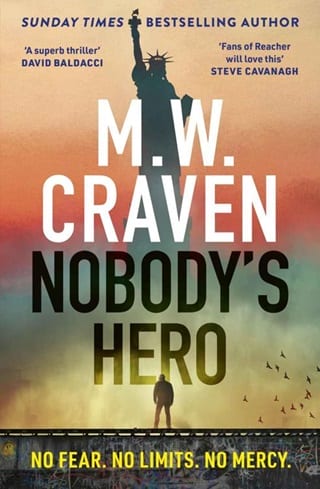Chapter 105
Chapter 105
‘Out of left field’: baseball terminology for the base runner sprinting to home plate being surprised by a throw from left field.
It now means unexpected.
The East Coast Sweeney had been unexpected. So had Margaret using her hairpin to murder Hobbs and a shard of bone china to slash her own throat.
And now Elizabeth Carlyle had asked Koenig what he knew about the Partition of India. She had come out of left field.
Because when he’d figured out the Acacia Avenue Protocol was an attack on the US’s critical infrastructure, he’d expected Carlyle to reel off one of the greatest hits. The transportation network is always vulnerable, particularly bridges and tunnels. The infrastructure-reliant Global Positioning System – GPS – can be disrupted. The power grid is susceptible to acts of men, like terrorism, and acts of God, like solar storms. A successful cyberattack on the financial markets would have generational consequences. And these were the risks he’d known about a decade ago. Things would have moved on. The more advanced infrastructure became, the more susceptible it became to bad actors. It was the price of advancement.
But Carlyle hadn’t reeled off one of the greatest hits. She’d asked him about the Partition of India. What he knew about it. Which wasn’t much. Other than the headlines. That it was when Britain split one country into two: India and Pakistan. It was probably on the British curriculum, but it wasn’t taught in American schools.
‘I know it didn’t go as planned,’ Koenig said.
‘That’s like saying the Challenger launch didn’t go as planned,’ Carlyle said. ‘It was an unmitigated disaster. I can’t even say it was an unmitigated disaster from start to finish, as the consequences are still being felt today.’
‘This is important?’
Naval Base San Diego was sealed tighter than a frog’s ass. SEALs in the water, eyes in the sky. A dozen other security measures, some so secret they wouldn’t even be written down. It was secure. Koenig knew that. He also didn’t care. Naval Base San Diego wasn’t the target. It was chicanery. Smoke and mirrors. Tas had his eyes on a much bigger prize. He’d also pulled the time-to-murder-your-team-and-go-it-alone trigger. That meant they didn’t have long. Maybe not even long enough for a history lesson. Carlyle knew this. Yet she still thought he’d benefit from the context.
So instead of insisting she get to the point, he said, ‘Tell me what I need to know.’
Carlyle nodded. Like she understood the mental gymnastics he’d gone through. An unspoken acknowledgement that she thought the same.
‘A little history,’ she said. ‘The East India Company gained a foothold in India in the early seventeenth century. They took effective control in 1757 following the Battle of Plassey in Bengal. The company’s principal aim was plunder through taxation and one-sided trade treaties. They acted on behalf of the British government until the Indian Uprising of 1857. That’s when the British Crown stepped in and instituted direct imperial rule. This period, lasting until Indian independence in 1947, is known as the Raj.’
‘I worked with a guy whose grandfather was a colonel out there,’ Koenig said. ‘He showed me photographs. The Brits lived like kings. Massive houses, servants, cooks, gardeners, chauffeurs, the lot.’
‘They did,’ Carlyle agreed. ‘And it’s why it ultimately failed. The powerlessness of Indians to decide their own future led to an increasingly inflexible independence movement. The British had always managed rebellions with brutal suppression, but after the Second World War their economy couldn’t cope with an overextended empire. It was agreed that they would exit India and split the country into two independent nation states: the Hindu-majority India and the Muslim-majority Pakistan. But instead of managing Partition carefully, the British rushed it. A civil servant called Cyril Radcliffe, a man who hated India from the moment he disembarked to the moment he set sail back to Britain, headed up the boundary committee. The process should have taken three years. Radcliffe did it in five weeks. He used out-of-date maps and census reports, and then drew an arbitrary demarcation line. The Radcliffe Line. It came into effect in August 1947. The British then left and washed their hands of the whole thing.’
‘Five weeks to decide the fate of a continent?’ Koenig said. ‘No wonder they screwed it up.’
‘What followed was one of the greatest human tragedies of the twentieth century,’ Carlyle agreed. ‘All along the Radcliffe Line, communities that had coexisted for a millennium turned on each other overnight. There were mass killings and mass abductions. There were forced conversions. Villages were set ablaze. Men, women and children were hacked to death. Rape was commonplace. British soldiers who’d seen Nazi death camps said Partition was worse.’
Koenig didn’t respond. Anything he said would have seemed pedestrian. Too small.
‘But the think tank didn’t study the Partition of India because of the sectarian violence,’ Carlyle continued. ‘Despite what you might read, the United States takes the First Amendment seriously. The freedom to practise your religion is constitutionally guaranteed. Our country will never tear itself apart on religious grounds.’
‘What did you study it for, Bess?’ Koenig said gently.
‘Mass migration,’ she replied. ‘The Acacia Avenue think tank studied the Partition of India because it led to the greatest mass migration in human history.’
 Fullepub
Fullepub 



